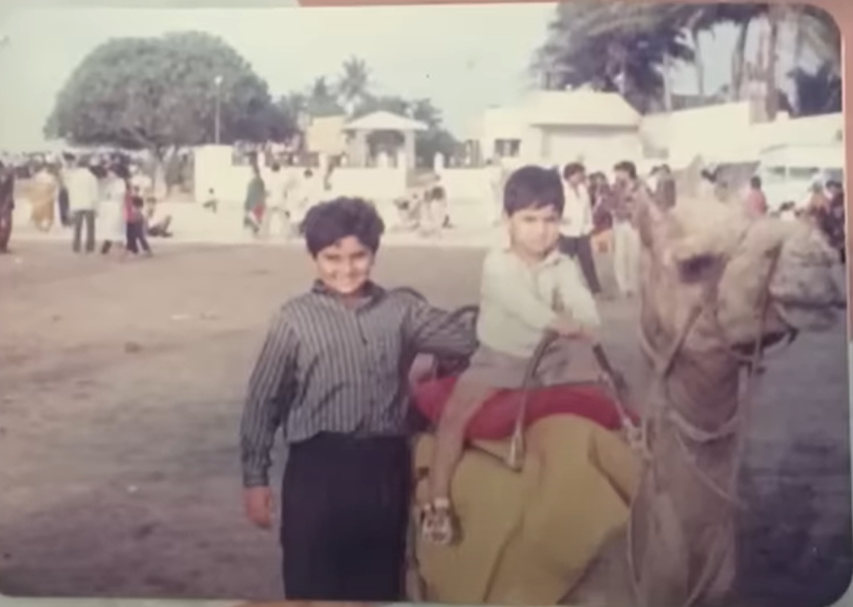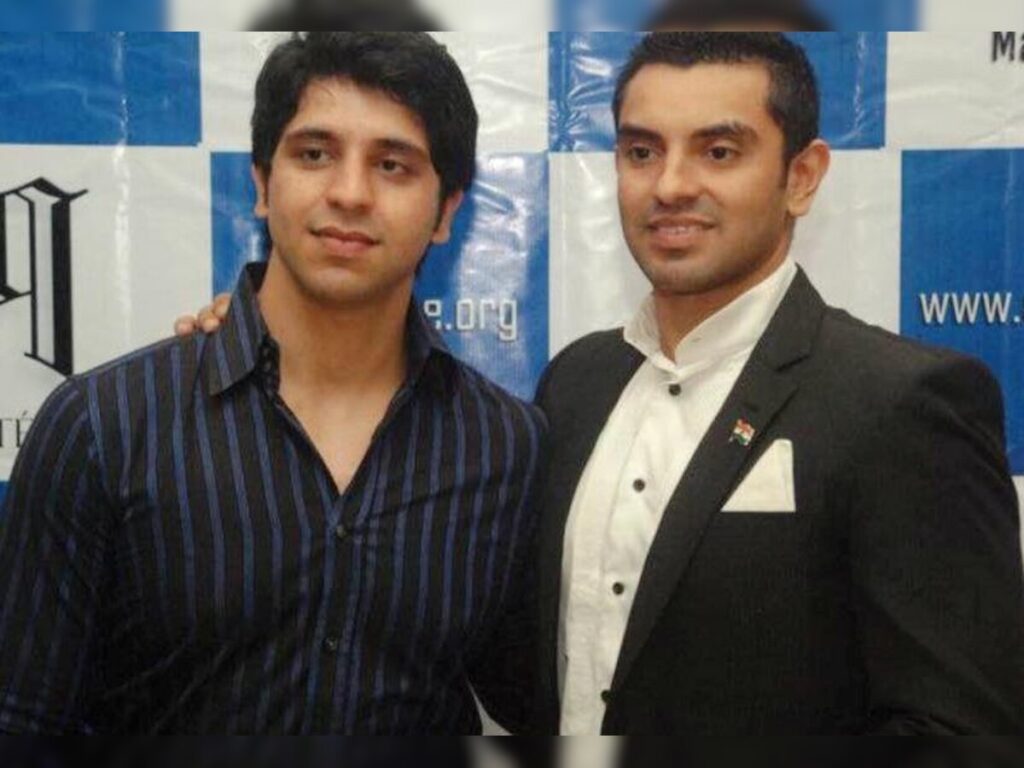We all have our political ideologies, and it’s not necessary that they align with those of our parents, friends, siblings, or other family members. Our political beliefs may differ from those of our loved ones, and in such cases, it often results in light banter. We generally don’t mind this, and it’s quite common. In politics, we see examples of people from different parties, with contrasting ideologies, marrying and living happily together. It’s also common for two brothers from different parties, with differing ideologies, to maintain good relations. Many politicians have friends across party lines, and we often see them enjoying each other’s company after work. The reason behind this is simple: “Disagreements happen, but they shouldn’t lead to discord.”
But have you ever heard of two real brothers, because of differing political ideologies, who stopped talking and meeting each other? Shehzad Poonawalla and Tehseen Poonawalla are brothers; Shehzad is a national spokesperson for the BJP, while Tehseen is a Congress supporter. A few months ago, they revealed that they hadn’t talked, messaged, or met in seven years, except during political debates on TV. They both have blocked each other’s numbers. From living together normally to blocking each other—how did things escalate? Let’s understand this from the beginning.

Childhood
Tehseen and Shehzad came from a well-to-do family. Their father had a construction and civil maintenance business. Tehseen is six years older than Shehzad. They lived in Pune, and everything was going smoothly until they lost their father. Shehzad was only five and a half years old when their father passed away. Suddenly, their financial situation took a dip. Their mother, a housewife, was now responsible for managing the business. Although she held a B.Sc. degree, she didn’t know much about the business, as it was unrelated to her field. Nevertheless, she learned how to run the business and worked tirelessly to manage both home and business. Tehseen and Shehzad witnessed their mother’s struggle. Since Shehzad was very young when their father passed, Tehseen took on the role of a father figure in Shehzad’s life. Tehseen always tried to ensure that Shehzad didn’t feel the absence of their father. As a result, the two brothers were very close.
Tehseen, at a very young age, ventured into businesses such as gyms, nightclubs, and restaurants, eventually regaining financial stability. Shehzad, around the 7th or 8th grade, realized that he wanted to work for the betterment of society. So, he decided to go to Delhi and joined the Congress. There, he started working for Congress in the NSUI (National Students’ Union of India) and later became an office-bearer. During his early days in Congress, Shehzad worked alongside senior members such as Digvijay Singh and Manish Tewari. At the time, Rahul Gandhi was the General Secretary in charge of the youth wing, NSUI. Rahul had promised that all office-bearers would be elected through free and fair elections based on merit. However, after four to five years of working in Congress, Shehzad realized that important posts were being given only to the sons and daughters of existing Congress leaders. Despite hoping for change, Shehzad noticed that nothing was improving, and things seemed to be getting worse.
In 2013, a spokesperson training session took place, and Shehzad was one of the participants. A performance test was conducted, assessing body language, voice, and content to select the spokespersons for Congress. According to the judges, Shehzad performed the best, but when the list of selected spokespersons was released, his name was not on it. Instead, the selected spokespersons were people like Ajay Maken, Randeep Surjewala, and others close to the Gandhi family. Tehseen also admitted that the situation was unfair to Shehzad in Congress.
As a child, Tehseen had been interested in politics and aspired to become an MP. Although he didn’t know the path forward, Tehseen had many political friends in Pune. He also went to Delhi, where he worked alongside Shehzad for Congress. However, Tehseen didn’t want to join politics directly and continued managing his business in Delhi. Though Shehzad was not selected as a spokesperson, he was a lawyer, and news channels started inviting him as a legal participant. Shehzad claimed that Congress officials called news channels and threatened them that if they invited him for a debate, Congress would not send its spokesperson. Despite facing these challenges, Shehzad didn’t quit Congress; he believed that with hard work, he would eventually be recognized.
Tehseen agreed that Congress was sidelining Shehzad, but his perspective was that this might have been due to Shehzad dating Monica Vadera, who later became his wife. Monica is the cousin of Robert Vadera, who is married to Priyanka Gandhi. Tehseen believed Congress members were jealous of Shehzad, thinking he had access to the Gandhi family. Shehzad and Tehseen often visited Priyanka Gandhi’s house, and Tehseen even discussed Shehzad’s issues with Priyanka Gandhi.

The Turning Point
In 2017, there were discussions about Rahul Gandhi becoming the President of the Congress party. Shehzad was deeply disappointed by this. He wrote a letter to Rahul Gandhi, detailing his journey in Congress, his struggles, and his disappointment with the party’s dynastic politics. He criticized the promotion of children of leaders at the expense of merit, a situation he had personally experienced. Shehzad also demanded free and fair elections for the Congress president post, questioning whether Rahul Gandhi’s leadership was based on merit or family connections. This letter was somehow leaked to the media, despite Shehzad claiming that it was Rahul Gandhi’s office staff who had leaked it. The bold stance Shehzad took caused a significant controversy.
Two or three days before the letter was leaked, Tehseen was informed about it. He spoke to Shehzad and asked him not to take any immediate action, suggesting they would discuss it later. Tehseen wanted to focus on the upcoming Gujarat Assembly elections and hoped Congress would win. However, after the letter was leaked, it created a massive political storm, with questions being raised about Congress’s internal dynamics.
After the letter leak, Tehseen publicly distanced himself from Shehzad. He made it clear that Shehzad’s views did not reflect those of their family and emphasized his loyalty to Congress. Tehseen even stated that he no longer considered Shehzad part of his family and suggested that Shehzad was pursuing his own political ambitions at the cost of their familial relationship. This marked the formal breakdown of their relationship, driven by stark political and ideological differences. Tehseen claimed that the incident had tarnished Congress’s image, which ultimately led to the party’s loss in the 2017 Gujarat Assembly elections. He believed that if the letter had not been leaked, Congress would have won the election, and he was determined not to let the BJP come to power.
The Aftermath
Since 2017, Shehzad and Tehseen have not communicated, messaged, or met each other except during TV debates or in newsrooms. The only exception was when Shehzad sent a message to Tehseen after his son was born. However, despite their personal and political differences, both brothers have refrained from speaking ill of each other. They criticize each other’s political ideologies, but Tehseen has repeatedly acknowledged Shehzad’s talent and hard work, calling him one of the best spokespersons of the BJP. On the other hand, Shehzad has praised Tehseen, calling him a genuinely good person, with a heart full of kindness.
Closing Thoughts
The story of Shehzad and Tehseen Poonawalla serves as a stark reminder of how political differences, when left unchecked, can lead to deep personal divides. While it’s natural for individuals to have different ideologies, these differences should never overshadow the bonds of family. Politics should challenge us to think critically, but it should not tear apart the respect, love, and unity that are fundamental to our relationships. Let this story remind us that no political belief is worth sacrificing a cherished family connection. In a world filled with division, we must remember that disagreements should never come at the cost of the ties that bind us.